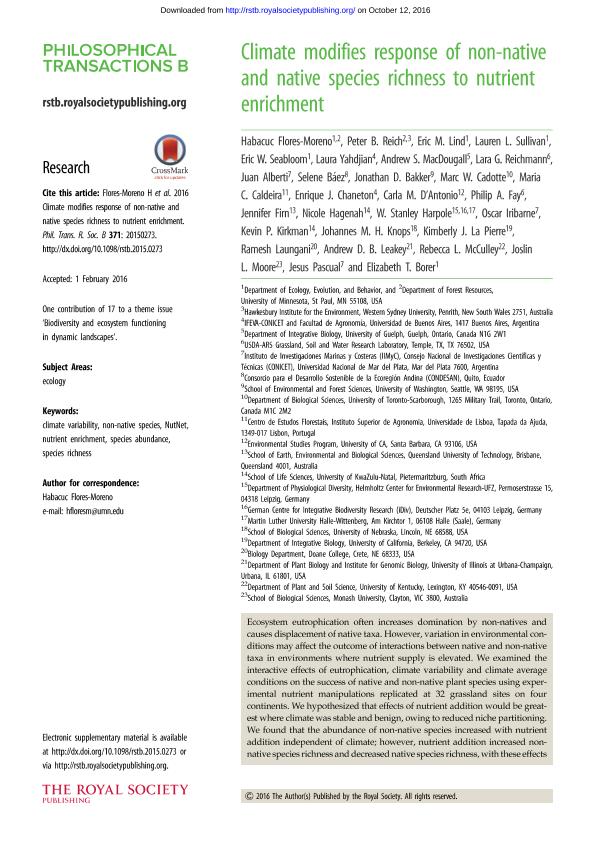Artículo
Climate modifies response of non-native and native species richness to nutrient enrichment
Flores Moreno, Habacuc; Reich, Peter B.; Lind, Eric M.; Sullivan, Lauren L.; Seabloom, Eric W.; Yahdjian, María Laura ; MacDougall, Andrew S.; Reichmann, Lara G.; Alberti, Juan
; MacDougall, Andrew S.; Reichmann, Lara G.; Alberti, Juan ; Báez, Selene; Bakker, Jonathan D.; Cadotte, Marc W.; Caldeira, Maria C.; Chaneton, Enrique Jose
; Báez, Selene; Bakker, Jonathan D.; Cadotte, Marc W.; Caldeira, Maria C.; Chaneton, Enrique Jose ; D'Antonio, Carla M.; Fay, Philip A.; Firn, Jennifer; Hagenah, Nicole; Harpole, W. Stanley; Iribarne, Oscar Osvaldo
; D'Antonio, Carla M.; Fay, Philip A.; Firn, Jennifer; Hagenah, Nicole; Harpole, W. Stanley; Iribarne, Oscar Osvaldo ; Kirkman, Kevin P.; Knops, Johannes M. H.; La Pierre, Kimberly J.; Laungani, Ramesh; Leakey, Andrew D. B.; McCulley, Rebecca L.; Moore, Joslin L.; Pascual, Jesus Maria
; Kirkman, Kevin P.; Knops, Johannes M. H.; La Pierre, Kimberly J.; Laungani, Ramesh; Leakey, Andrew D. B.; McCulley, Rebecca L.; Moore, Joslin L.; Pascual, Jesus Maria ; Borer, Elizabeth T.
; Borer, Elizabeth T.
 ; MacDougall, Andrew S.; Reichmann, Lara G.; Alberti, Juan
; MacDougall, Andrew S.; Reichmann, Lara G.; Alberti, Juan ; Báez, Selene; Bakker, Jonathan D.; Cadotte, Marc W.; Caldeira, Maria C.; Chaneton, Enrique Jose
; Báez, Selene; Bakker, Jonathan D.; Cadotte, Marc W.; Caldeira, Maria C.; Chaneton, Enrique Jose ; D'Antonio, Carla M.; Fay, Philip A.; Firn, Jennifer; Hagenah, Nicole; Harpole, W. Stanley; Iribarne, Oscar Osvaldo
; D'Antonio, Carla M.; Fay, Philip A.; Firn, Jennifer; Hagenah, Nicole; Harpole, W. Stanley; Iribarne, Oscar Osvaldo ; Kirkman, Kevin P.; Knops, Johannes M. H.; La Pierre, Kimberly J.; Laungani, Ramesh; Leakey, Andrew D. B.; McCulley, Rebecca L.; Moore, Joslin L.; Pascual, Jesus Maria
; Kirkman, Kevin P.; Knops, Johannes M. H.; La Pierre, Kimberly J.; Laungani, Ramesh; Leakey, Andrew D. B.; McCulley, Rebecca L.; Moore, Joslin L.; Pascual, Jesus Maria ; Borer, Elizabeth T.
; Borer, Elizabeth T.
Fecha de publicación:
05/2016
Editorial:
The Royal Society
Revista:
Philosophical Transactions of the Royal Society B: Biological Sciences
ISSN:
0962-8436
e-ISSN:
1471-2970
Idioma:
Inglés
Tipo de recurso:
Artículo publicado
Clasificación temática:
Resumen
Ecosystem eutrophication often increases domination by non-natives and causes displacement of native taxa. However, variation in environmental conditions may affect the outcome of interactions between native and non-native taxa in environments where nutrient supply is elevated. We examined the interactive effects of eutrophication, climate variability and climate average conditions on the success of native and non-native plant species using experimental nutrient manipulations replicated at 32 grassland sites on four continents. We hypothesized that effects of nutrient addition would be greatest where climate was stable and benign, owing to reduced niche partitioning. We found that the abundance of non-native species increased with nutrient addition independent of climate; however, nutrient addition increased nonnative species richness and decreased native species richness, with these effects dampened in warmer or wetter sites. Eutrophication also altered the time scale in which grassland invasion responded to climate, decreasing the importance of long-term climate and increasing that of annual climate. Thus, climatic conditions mediate the responses of native and non-native flora to nutrient enrichment. Our results suggest that the negative effect of nutrient addition on native abundance is decoupled from its effect on richness, and reduces the time scale of the links between climate and compositional change.
Archivos asociados
Licencia
Identificadores
Colecciones
Articulos(IFEVA)
Articulos de INST.D/INV.FISIOLOGICAS Y ECO.VINCULADAS A L/AGRIC
Articulos de INST.D/INV.FISIOLOGICAS Y ECO.VINCULADAS A L/AGRIC
Articulos(IIMYC)
Articulos de INSTITUTO DE INVESTIGACIONES MARINAS Y COSTERAS
Articulos de INSTITUTO DE INVESTIGACIONES MARINAS Y COSTERAS
Citación
Flores Moreno, Habacuc; Reich, Peter B.; Lind, Eric M.; Sullivan, Lauren L.; Seabloom, Eric W.; et al.; Climate modifies response of non-native and native species richness to nutrient enrichment; The Royal Society; Philosophical Transactions of the Royal Society B: Biological Sciences; 371; 1694; 5-2016
Compartir
Altmétricas



